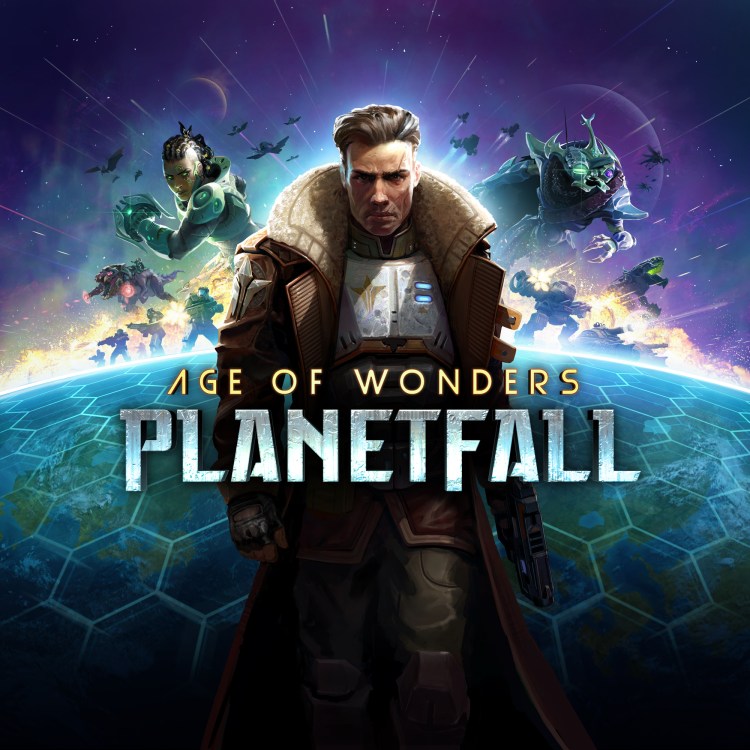Lennart Sas has been making strategy games since founding Triumph Studios with his friend, Arno van Wingerden, in 1997. It’s known of the Age of Wonder games, which are turn-based strategy games set in a fantasy setting. Triumph has also made Overlord, an action-role-playing series that casts you as an over-the-top bad guy with a host of silly minions (it feels like a Monty Python sketch at times).
But now, Triumph is setting aside dwarves and goblins, magic and mystics, for laser guns, bioengineered soldiers, and mechs. Age of Wonders: Planetfall takes the 20-year-old franchise into a science fiction setting, keeping its turn-based combat. It’s also an evolution on past Age of Wonders game, offering both more tactical options to how you approach exploring the map and combat.
Planetfall follows what’s been a successful period for Triumph. The studio self-published Age of Wonders III in 2014, and by 2016, it had sold more than 500,000 copies. This helped Triumph put out a pair of expansions. And all of this success led to Paradox Interactive acquiring the studio in 2017.
In 2017, Paradox wasn’t sure if it would change how Triumph made Age of Wonders. And despite Triumph picking a new setting, it sure looks like the Swedish publisher is leaving Triumph to do what it does best — make strategy games with tactical depth.
June 5th: The AI Audit in NYC
Join us next week in NYC to engage with top executive leaders, delving into strategies for auditing AI models to ensure fairness, optimal performance, and ethical compliance across diverse organizations. Secure your attendance for this exclusive invite-only event.
That’s what I found with my hands-on session with the PC version. Age of Wonders: Planetfall is coming out August 6 for PC, PS4, and Xbox One. Afterwards, I talked to Sas (Triumph’s CEO and Planetfall’s creative director) about what I played, the studio’s business before and after the Paradox acquisition, changing to a sci-fi setting, and the burgeoning competition Steam is seeing from the Epic Games Store, Discord, and more.
This is an edited transcript of our interview.
No post-acquisition paradox here
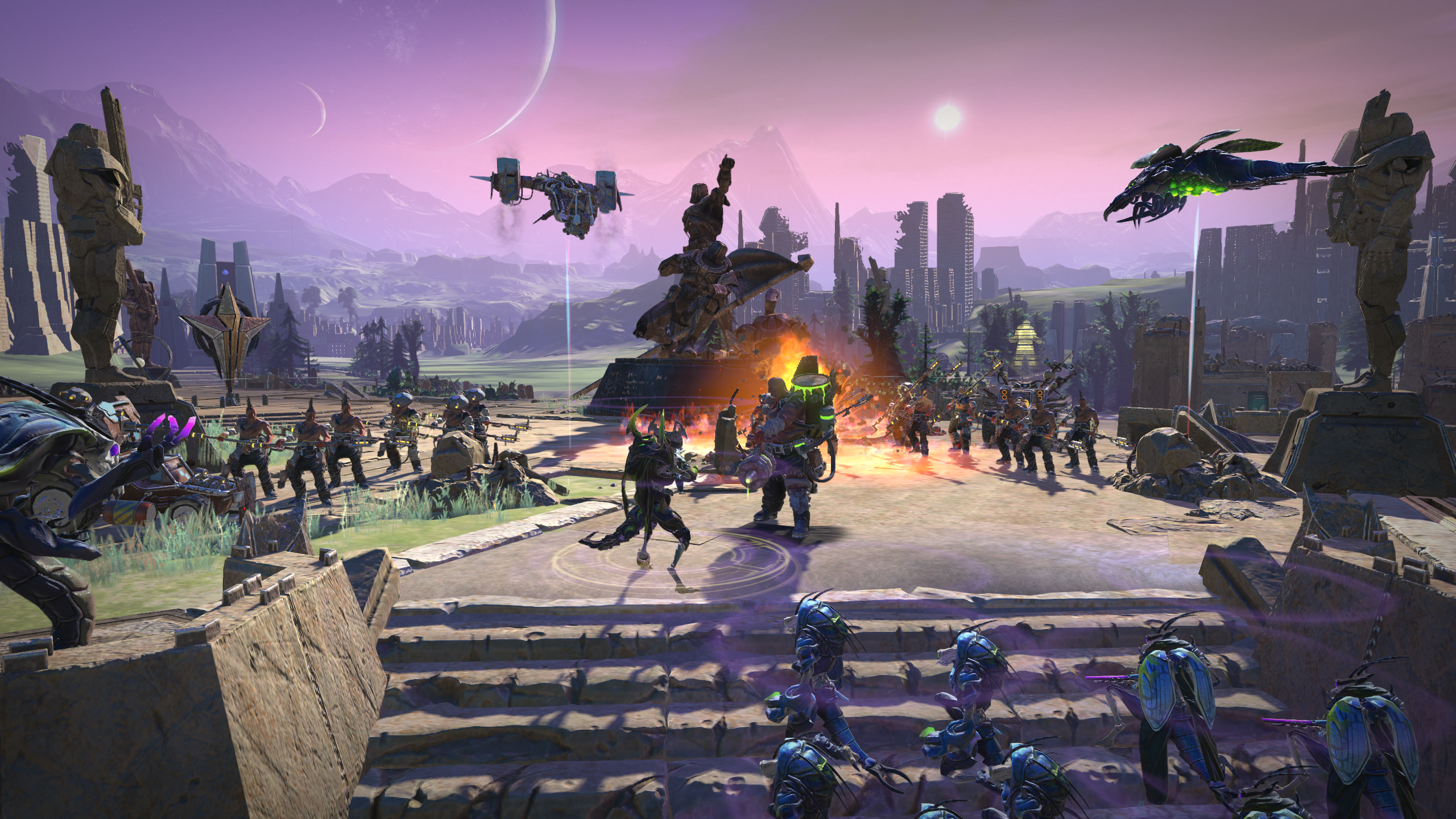
Above: Age of Wonders, with a sci-fi sheen.
GamesBeat: You self-published the last Age of Wonders game in 2014. Did you not have anyone interested in publishing it, or did you just want to do it on your own?
Lennart Sas: No, there was lots of interest in having in published, but it was sort of the golden age of self-publishing, so we gave that a shot. The game was hugely successful for us. It went really well. We did two expansions, Eternal Lore and Golden Realms. It went really well. Paradox approached us somewhere in 2016 and said, you’re doing nicely, but would you want to consider doing this as a part of Paradox? That’s when we got acquired.
GamesBeat: It’s hard to say no to Paradox. It’s a very good company.
Sas: Absolutely. It’s a very compatible culture. It seemed like a natural fit.
GamesBeat: Triumph was in fine shape, then, when Paradox came knocking.
Sas: Absolutely. We were profitable. You have sell high, not sell low.
GamesBeat: What’s it like, after the acquisition, to continue on with Triumph and not go found a new project?
Sas: We’re in it for the games. As directors we’re still heavily involved in making games. We’ve been going in the same way as before. The only thing is we don’t have to worry about a lot of the business decisions that we used to have to worry about, like finding an external investor or sorting all sorts of legal stuff surrounding the projects. We can just focus on the creativity and tech side of things, which we really like.
GamesBeat: Which engine are you using? Is this something you built inside?
Sas: It’s our own engine, the Creator engine we call it. It’s a 64-bit native engine. It’s tailored to this type of game. We have an entire modding engine for the fanbase. It’s our own engine.
Strategy landscape
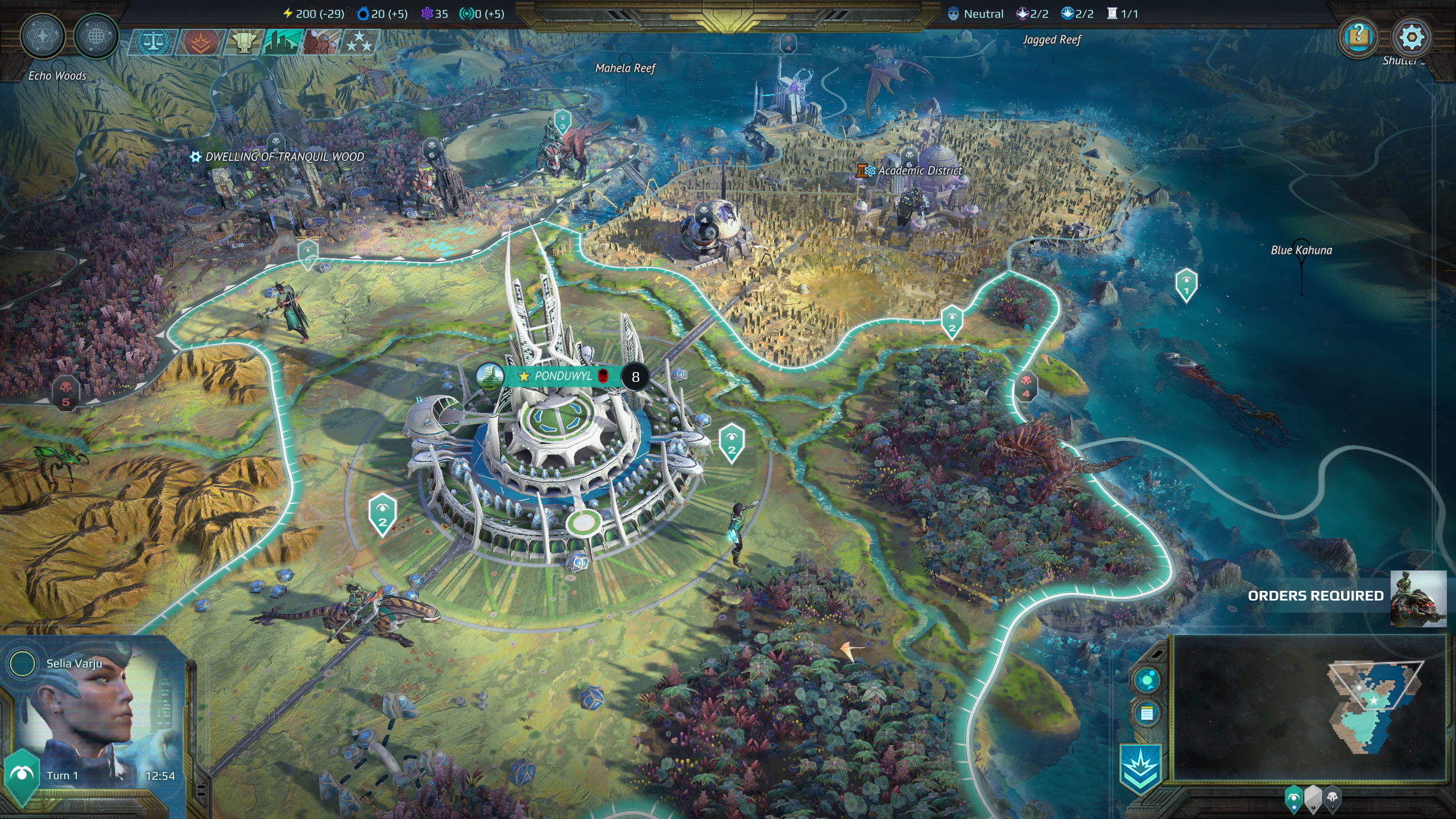
Above: The world, from an Amazon’s point of view.
GamesBeat: How you do you view the landscape for turn-based strategy games these days?
Sas: It’s still going very strong. If you look at the position of turn-based strategy as opposed to RTS, for example, there’s been a renaissance of turn-based strategy over the last couple of years. Starting off with Civ and XCOM breaking through a long way. If I look now at what Age of Wonders 3 compared to the sort of golden age of Age of Wonders games, the late ’90s and early 2000s, Age of Wonders 3 outsold that by a big factor. Not 20 percent, but a couple of hundred percent more. That says a lot, I think, about the genre. The audience has grown a lot because of digital distribution. It[‘s a lot more accessible compared to those old days where you had limited shelf space and a lot of these niche titles between brackets. They managed to stay on the shelves for a lot shorter time. It’s a very good time to make turn-based strategy games.
GamesBeat: Europe seems to be a hotbed of turn-based strategy game between what you’re doing, Paradox, Amplitude, and a host of indie studios. Why is turn-based strategy feeling so strong in Europe?
Sas: I don’t know if it’s just Europe. It’s America as well. If you look at sales numbers from large titles, they seem to be doing equally as well in America.
But I think it’s something to do with an aging gamer population that keeps on playing. Especially when you have kids, it’s very convenient to play a turn-based game. You have your laptop, between other stuff going on in your life. The way we set up multiplayer, where you can take turns with your friends. That cloud-based gameplay is very convenient. It works well on laptops. It works well on consoles even. I think that’s one of the factors.
From sword & sorcery to mechs and laser beams
GamesBeat: Was it difficult for your team and for yourself to get out of the mindset of fantasy medieval units and work on sci-fi?
Sas: A little bit. Of course we’ve been science fiction fans for all our lives. We grew up watching the old Battlestar Galactica. I was a six year old boy. That defined a lot. Star Wars, all that stuff. We know all the pop culture stuff. But translating that into a game world is a lot more work. Especially, Age of Wonders was more of a classic fantasy setting, relying on more direct tropes. In science fiction there’s a lot more freedom to shape your future. The entire world, the Star Union, all the faction designs, they rely less heavily on predefined tropes. Of course sometimes we still talk about, oh, let’s cast a spell, when we really mean let’s use an operation. It’s been a lot of fun to do a science fiction game for once.
GamesBeat: What’s one aspect of science fiction that you’ve put into this game that you yourself love?
Sas: Primarily the way that the world of the Star Union is a reflection of our own world and what could happen to it. The doomsday scenarios looming over the horizon that we made real in this game. The technological changes affecting the world, like mass automation maybe resulting in mass unemployment, doomsday weapons, sentient AI, ecological disaster, genetic modification. What does it mean to be human in such a world? What ideological differences are there between people, between factions? Where does humanity go to? Those questions are things we deal with in this game, especially in the single-player campaign.
GamesBeat: You have cyborgs and bioengineers. Do you have any bio-hackers on staff and say, hey, let’s get a bit of you into this?
Sas: [Laughs] We do have a lot of people interested in those types of things. Bio-hacking itself is still a world that’s — I think people are using the term nowadays, but for us it’s still fantasy.
Faction folio
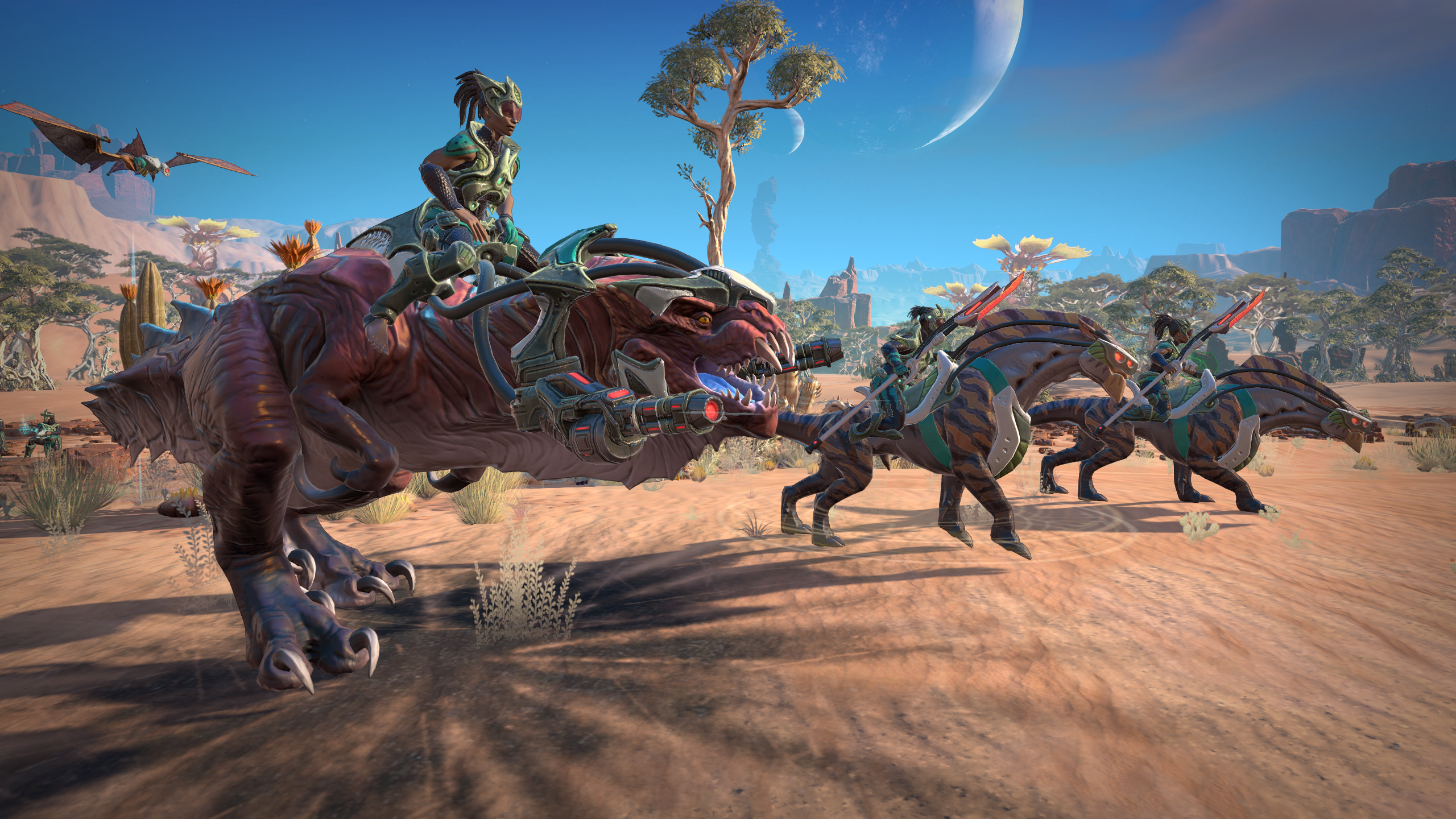
Above: Amazons riding space dinosaurs — living the dream.
GamesBeat: The Amazons, why name them that? You talk about sci-fi giving you a chance not to have tropes, but here we are with a trope.
Sas: The Amazons, of course, are an all-female faction of bioengineers. We wanted to make something that’s recognizable to people as well as something new. There’s always a balance between the two. But how we fill that in is–that they emerge from a terraforming faction. They’re the scientists. They’re able to modify themselves, as well as the environment around them. You can’t really say, oh, these are space elves or something like that. They might play that role, but they’re scientists. They’re modeled after female MMA fighters as far as their physical appearance. There’s a bit of dino-riders in them in terms of the creatures they use. It’s nice mix of a faction. We put the name Amazons on them, but we could have named them something else.
GamesBeat: Does Amazon also fit because they believe in bioengineering, the perfection of mind and perfection of body — that fits the classic Amazon? Does it just work that way?
Sas:Sometimes it does. Sometimes it’s good to be clear.
GamseBeat: Why did you decide on space dinosaurs?
Sas: Why not? What’s not cool about space dinos? There are some elements of camp that are cool, like lasers on space dinos with warrior women riding them. It’s a fantasy.
GamesBeat: Another thing I liked were the operations, where you take the idea of big spells from Age of Wonders and other fantasy games and you transport it into there. Was that something you came upon early in the design as a mechanic, or did it emerge later on?
Sas: We always wanted to have something that supports more tactical gameplay. It’s a supporting function. Another element we added are covert operations. You can spy on enemies using the same system. We have something like a doctorate, where you can install societal policies. We all grouped that into one system called operations. First those were separate systems, and then we combined it all into one.
GamesBeat: You built a lot of support in the skills and the research and the technologies into these operations. When I was creating my Amazon, I noticed how so much of this supported Xenoplague, so I chose that. And who doesn’t want to turn the enemies into a bunch of xenomorphs.
Sas: [Laughs] Why not?
Different approach
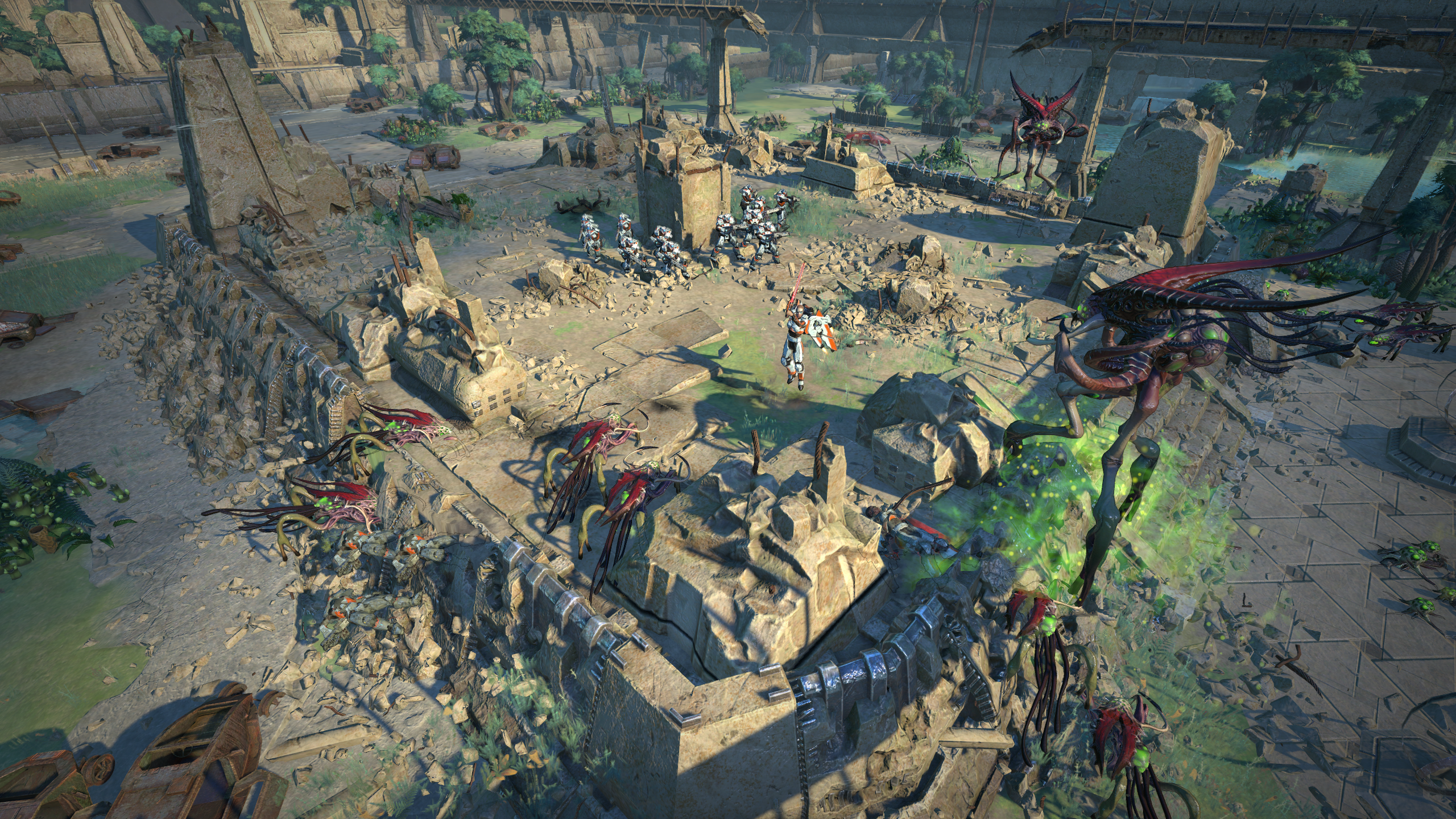
Above: Amazons focus on beasts, melee combat, and xenology — creating nasty monsters.
GamesBeat: It seems much easier than some of the older Age of Wonders games to just jump into. Was that part of the intention of your design?
Sas: We have to be careful that we never make these games too overwhelming. We made a couple of decisions to ease players into the game, including a special tutorial that you got. We had very heavy overloaded early turns, where all the systems hit the player at first.
GamesBeat: I kept getting alerts.
Sas: We spread some content over the first few turns. We don’t have research unlocking on turn one. That’s on turn two. The city annexing, city growth, happens a bit later. Operations unlock later. That way you get to to know the systems a bit better.
GamesBeat: For me it works. It feels really smooth and easy. You were talking about fitting in between a Civ and Heroes of Might and Magic. It reminds of … do you remember Star Wars: Empire at War?
Sas: I haven’t played that.
What’s in store
GamesBeat: Is Ages of Wonder going to be on Steam or the Epic store, or are you going to try to sell it everywhere?
Sas: It’s going to be on multiple stores, yeah. I don’t know exactly ones, but Steam is one of them.
GamesBeat: As a long-time PC game studio, you see this emerging store war coming. Do you have any thoughts on what’s happening?
Sas: It was bound to happen. Steam was in a very luxurious position for a very long time. You expect that people would try to take a jab at it. But I think the larger thing that’s going to happen in the coming future is the streaming portals you’ll see. Lots of big investments in that arena. That’s going to be the big change. This is only the opening shots to that massive change in digital distribution.
GamesBeat: When people going from buying games to a Netflix-style monthly subscription, does that make you nervous as a game studio?
Sas: I’m no longer the boss, but it’s interesting. A lot of these things have changed and made things better for smaller studios like us. If you look at the types of games that allow people to play for a very long time, to spend a lot of hours and be highly engaged in content, with multiplayer functions, I think that it doesn’t matter much how you distribute it. If I were making games that were smaller single-player experiences, that are one-offs, then I’d be more worried.
GamesBeat: It seems like Planetfall is wearing some of its influences on its sleeve, like we’re talking about with the Amazons. Jack chomping at the cigar reminds me of old marine sergeants in StarCraft. You have his line about how the only good bug is a dead bug — Starship Troopers right there. Are you trying to make these little connections for people? Or are you just doing it because you enjoy it?
Sas: Part of it goes back to Overlord, which was a sort of genre parody in fantasy. That was really obvious, of course. This game is a bit more subtle, but we do like to show some references. The game is massive. You have all these various factions, NPC factions, and secret technologies. To have a couple of references strewn about the place is going to make things more enjoyable for people. It’s on purpose, absolutely.
GamesBeat: When you put this game out, are you going to have big traditional expansions, or are you looking at smaller chunks of DLC?
Sas: Our primary focus is going to be the larger expansions, but there might be smaller ones as well.
GamesBeat: What are you most proud of so far with Planetfall? What do you point to and say, we did something really good here?
Sas: Just playing it, seeing where it all comes together. The universe, the design of the factions, the way the unit modding works and connects the strategic layer with the tactical battles. The sector system is way beyond a science fiction version of Age of Wonders. It’s a new generation of technology. I’m really proud of what the team put together here. It’s really the next level up from the original game.
